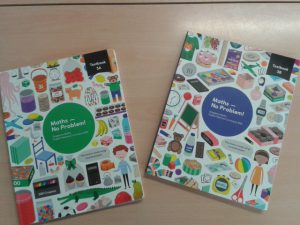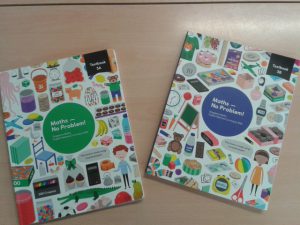
November 3, 2016, by Rupert Knight
Are textbooks in the primary school the answer? To what problem?
Primary schools in many ‘high performing countries’ use textbooks in primary classrooms. In this post, Jane Medwell explores the role they may play in English classrooms.
In 2014 Nick Gibb told us told to “shed the anti-textbook culture” in primary schools: “In England, 10 per cent of 10-year olds are issued textbooks. In South Korea, the figure is 99 per cent.”
This is true- but what difference does it make? Would textbooks work for us?
Who uses textbooks?
Asian countries like Shanghai, Singapore and Korea, who perform really well in the PISA international comparisons, all use textbooks for each subject. In Shanghai, for example, teachers expect each child to have a textbook and a workbook for each subject, in each year.
In Shanghai, the maths textbook is used in class to deliver a “mastery” curriculum in lessons carefully prepared to use textbook examples. The workbook is used for homework to follow up and practice each lesson (and parental supervision and assistance is expected). The teacher marks each workbook every day and spends more time marking than teaching. A Shanghai maths teacher would usually teach just 4 lessons of 35 minutes a day, as well as marking, working with groups and individuals, planning lessons and spending time on the phone and social media to parents.
Why use textbooks?
In his 2014 report ‘Why textbooks count’ Tim Oates concluded that “High quality textbooks are not antithetical to high quality pedagogy – they are supportive of sensitive and effective approaches to high attainment, high equity and high enjoyment of learning. A failure to recognise this may be impeding improvement of education in England.” If using textbooks is a way to improve performance, it is not surprising that the use of textbooks is one of the practices adopted by the Maths Hubs, who have produced their own guidance. Several new maths schemes are flourishing on this basis.

What is it like to use these textbooks?
We asked a local maths co-ordinator in Nottingham, whose school has been using these textbooks to tell us about the experience.
- Why did the school choose to introduce textbooks?
- How did they go about introducing them to staff?
- How did the teachers integrate textbooks with their own existing practice?
- What did they learn from the process?
See the maths co-ordinator’s experience here:
Is reducing workload really the main advantage of textbooks?
The English government sees textbooks as a way to reduce teacher workload. The DfE’s recent white paper, Educational Excellence Everywhere has committed to developing textbooks for primary schools to reduce teacher workload so that teachers can ‘stop reinventing the wheel”, but would this really be the main advantage of textbooks? Teachers in Asian countries do as much preparation as our teachers, as the TALIS comparison data show; they just do a lot less administration and teaching.
Can you differentiate using textbooks?
Well, Shanghai teachers do it differently- they work with individuals and groups to make sure they can address the topic at some level and use homework to assess whether the children understand…
Textbooks in Asian countries- pros and cons
In Asian countries:
- parents love textbooks and workbooks. They are very cheap (because of mass production) and parents can see exactly what their child (and the teacher) has done- they monitor workbook marking rigorously, for instance;
- teachers love textbooks and workbooks. But the teachers still spend a lot of time planning lessons. The textbooks provides the backbone of the curriculum, and Asian governments are seeking to get their teachers to rely less on textbooks and to provide more creative challenge;
- private tutors love textbooks and workbooks. Textbooks also make planning easier for the teachers of “extra classes”. Private “extra” lessons are a practically universal experience for children in all these Asian countries;
- some children love textbooks and workbooks, which offer clear reference material and support them to learn.
So what could the possible disadvantages be? How could textbooks work for you?
Post a reply

Whilst seeing the benefits, it’s also easy to see why some teachers prefer not to use textbooks; they may see it interfering with their own teaching style and potentially loosing their creativity. Having mainly worked in schools without textbooks and one with ‘Maths No Problem’, it seems to work effectively both ways but may give some teachers an excuse become lazy in their teaching. As a student teacher in a school without textbooks, it will be interesting to find out what stage the school are in reviewing whether to implement textbooks into their teaching and also to experience the use of these in planning and teaching at a future placement.
Hey!
We are Lovely Teachers♥, a group of students from the University of Murcia. We are nowadays studying a degree in Primary Education and we really found your blog, AMAZING!!
It has helped us not only to complete a project we had to do last week, but also to learn more things about the use primary teachers do of textbooks.
Thanks for having such an amazing blog! 🙂
Looking forward to see your new posts!
Lovely Teachers♥